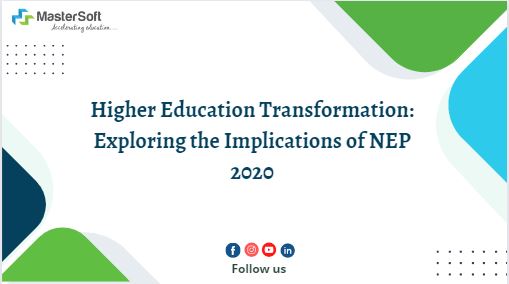The National Education Policy (NEP) 2020 is a comprehensive and ambitious document that outlines the vision for the transformation of the education system in India. One of the key areas of focus within the NEP is higher education. The policy envisions a complete overhaul of the higher education landscape in the country, aiming to align it with global standards, foster innovation, and promote holistic development. In this blog, we will delve into the implications of NEP 2020 on higher education and how it paves the way for a brighter future for both students and institutions.
Flexibility in Learning:
NEP 2020 emphasizes a multidisciplinary approach to learning, allowing students to choose subjects that align with their interests and career goals. This move towards flexibility will break down the rigid silos of traditional disciplines and encourage cross-disciplinary studies. Students will have the freedom to explore a wide range of subjects, fostering a more well-rounded education that enhances critical thinking and problem-solving skills.
Holistic Education:
The policy places a strong emphasis on holistic education, encompassing both academic and co-curricular activities. This shift aims to develop students’ cognitive, social, emotional, and ethical capacities. Institutions will be encouraged to integrate sports, arts, and vocational education, nurturing students into well-rounded individuals who are equipped to excel in various spheres of life.
Quality Enhancement:
NEP 2020 stresses the importance of maintaining and enhancing the quality of education. It advocates for the establishment of a National Research Foundation (NRF) to foster a culture of research and innovation. This foundation will provide grants for high-quality research projects, promoting the pursuit of knowledge and solutions to real-world challenges.
Multilingualism and Cultural Diversity:
The policy recognizes the richness of India’s cultural and linguistic diversity. It encourages the teaching and learning of regional languages alongside English and provides students with the opportunity to gain a deeper understanding of their cultural heritage. This approach not only preserves languages but also promotes inclusivity and a sense of belonging.
Technology Integration:
NEP 2020 highlights the importance of leveraging technology in education. It suggests the development of a National Educational Technology Forum (NETF) to facilitate the integration of technology into teaching and learning. This digital transformation will enable personalized learning experiences, improve accessibility, and prepare students for a technology-driven future.
Global Collaboration:
The policy envisions India as a global education destination. It encourages internationalization of higher education by promoting collaborations with foreign institutions, faculty exchange programs, and the recognition of foreign degrees. This will provide students with exposure to diverse perspectives and enhance the overall quality of education.
Teacher Empowerment:
NEP 2020 recognizes the pivotal role of educators in shaping the future. The policy aims to empower teachers through continuous professional development, promoting innovative teaching methodologies, and providing opportunities for research and upskilling.
Conclusion
The National Education Policy 2020 heralds a new era for higher education in India. By fostering flexibility, holistic development, quality enhancement, and technology integration, NEP 2020 aims to create a vibrant and globally competitive higher education ecosystem. As the policy’s implications unfold, students, educators, and institutions have the opportunity to collectively transform higher education into a dynamic and inclusive space that nurtures intellect, creativity, and innovation.











